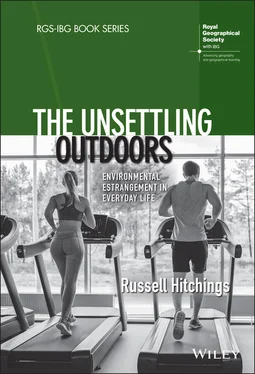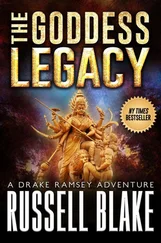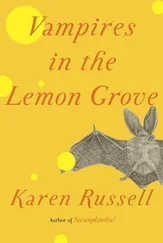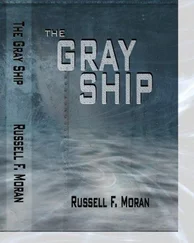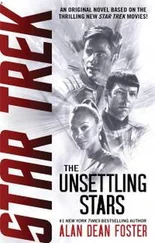2. The everyday outdoorsMeanwhile, in human geography, I found an eagerness to examine how exactly different groups lived with the ‘natural world’ and an interest in seeing social life as a negotiation with physical phenomena. These ideas have informed my focus on the everyday outdoors. Here I will partly follow their lead by paying particular attention to the specifics of the situations at hand and exploring how the various ‘natural’ materials involved are managed differently according to those specifics. The ‘outdoors’ commonly figures as a self-evident, unremarkable background feature of life. My aim here is partly to turn the tables on this situation by considering how the ‘outdoors’ is home to a whole raft of phenomena – living plants, changeable weather, different kinds of dirt – that deserve examination. This is what greenspace experience often involves, after all, and we should examine how these phenomena are allowed to complicate human lives at a time when the assumption that people are best kept away from them is often quietly gaining ground.
3. Unsettling practicesYet, just as some of my geography colleagues were seeking out and celebrating the capacities of various creatures and forces that were previously swept under the social science carpet, I also wanted to examine how people can be recruited into the reproduction of everyday practices in ways that meant these same capacities might fade into the background of their lives. So I turned to concepts of ‘social practice’ because they promised an appreciation of how the ‘extinction of experience’ was practically achieved in ways that the people involved might only be partly aware of. The key idea that I wanted to take forward from this work was therefore about seeing society as comprising practices that can recruit people in ways that, as we will see, might effectively act to distance them from certain beneficial outdoor experiences. In this regard, the value of these concepts stems from how they highlight the subtleties of these processes in which relevant groups figure as sometimes able to question, and potentially amend, their actions, and sometimes effectively controlled by the practices that live through them. In that respect, I wanted to examine how, in different contexts, a range of potentially unsettling environments were handled – when and how do people submit to the practice? And when and how might they struggle free in ways that take them towards a fuller relationship with the outdoors?
The book title is an attempt to combine all the above components into a succinct form of words to guide my endeavours in the following chapters. But I’m also quite keen on the ‘unsettling outdoors’ because of how it reframes the way in which societies like mine often think about how certain environments are, and should be, experienced by their members. All around the world, it is common to speak of the ‘great outdoors’. Imbued with various beliefs about healthy exercise and the personal regeneration that comes from escaping the stresses of city life, it’s an immediately appealing idea. It is also one which often pops up in our ongoing societal conversations about where people should go and what they should ideally be doing. And, to return briefly to some of the research findings with which this chapter started, we might agree that greenspace experiences could be ‘great’ in the sense that they do various good things to people, and in ways that might be more important than ever. Yet, as I have also argued, what many people find when they go outdoors may now feel somehow strange and unfamiliar to them. Indeed, it is exactly because of these attributes that it could be fairly tempting for certain groups to shun the outdoors in their everyday lives even though they may very well know that adjusting to it could be good for themselves, for others, and for the wider environment too. In short, though ‘the outdoors’ may be ‘great’ in principle, experiencing it can also be ‘unsettling’ in practice.
The Location and an Overview
My topic is now fixed. What remains are questions about how to go about exploring it. Building on the suggestion that the problem partly stems from the relatively recent human migration to cities, I take everyday life in one city as a focus. This is London. London is a city that contains various social practices that may be serving to separate pattens of everyday life and the possibility of beneficial greenspace experience. Though there is a relative abundance of greenspace in this city, I should emphasise upfront that I do not want to imply that, as soon as Londoners venture outside their buildings, they will immediately step into a restorative paradise teeming with healthy trees and plants. Rather my idea is that, in order to understand the likelihood of greenspace benefits infiltrating everyday lives, both in this city and elsewhere around the world, we can benefit from stepping back from the greenery focus and turning to how outdoor environments are handled by those with an established relationship with particular practices.
Four practices are considered and four characterisations of how people ended up relating to the outdoors are offered. First, I consider the practice of office work, how that has been studied with regard to greenspace experience and how those currently involved can end up ‘forgetting’ about outdoor environments nearby, whether green or not. Second, I turn to the practice of recreational running, how running has been connected to greenspace benefits, and why those who currently run indoors on treadmills do so partly because they are ‘avoiding’ exactly those outdoor environments in which they feel running should ideally happen. Third, I consider how well the idea of shopping fits with how Britons handle their domestic gardens and how, despite the ways in which some London garden owners are unsettled by the suggestion of living plants, they can end up ‘succumbing’ to the pleasures of a less controlling approach. Finally, we take a short trip away from the city to consider what has been said about the benefits of camping in more ‘natural’ environments before turning to the practice of showering and the ways in which young people (who otherwise wash more than most) cope with the challenge of a summer music festival. Here I examine how some of them can end up ‘embracing’ the dirt and discomforts of a shared experience outdoors in greenspace away from town. Together, I will argue, these processes (of forgetting, avoiding, succumbing and embracing) deserve more attention, despite rarely being the focus of those aiming to foster greenspace experience.
But before that, I want to say more about research methods since this book is also about strategies for studying social life. These are my concerns in the next chapter. Within it, I make a case for attending to how people speak of the social practices they are involved in carrying out and how practices can encourage people to speak in certain ways. I will also say some more about where we will go to explore environmental estrangement in the four case study chapters that follow. But, for readers who are less interested in research methods, it is possible at this point to skip forward to the case studies. As we go through those, the book will move from spaces of work, to spaces of exercise, to spaces of leisure, both at home and away. In this respect, it gradually turns to social contexts in which we might imagine there to be increasing amounts of time and inclination to revel in enjoyable and beneficial engagements with outdoor environments. These chapters will consider the extent to which this is the case before the book ends by drawing a series of broader conclusions about how the social future of greenspace benefits is investigated and influenced.
Читать дальше
